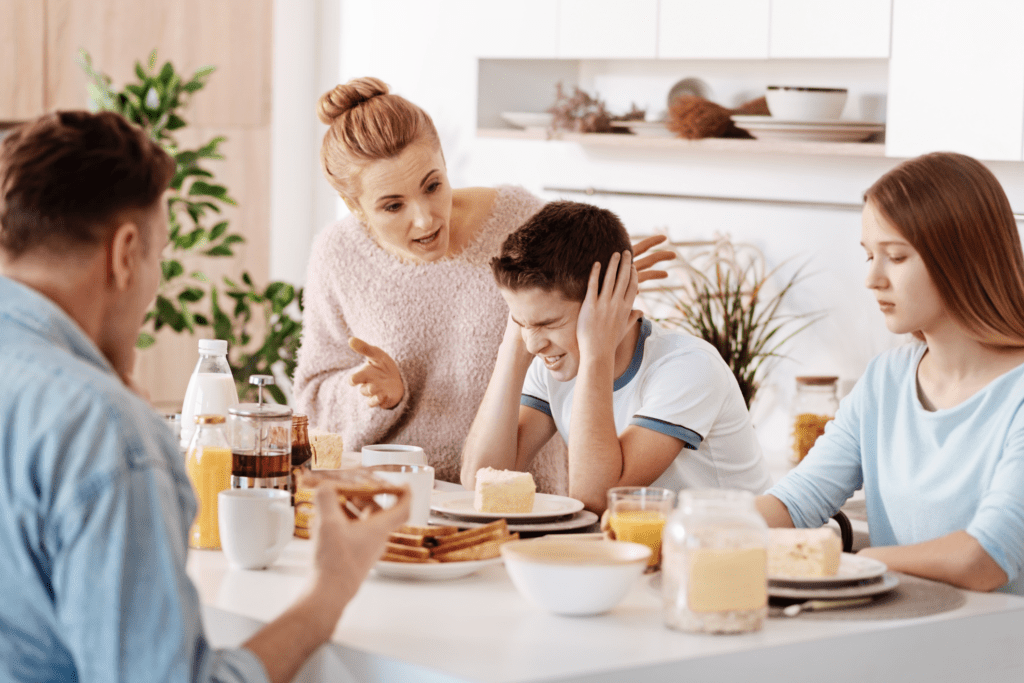What we’ll be talking about: To stop the cycle of yelling, parents can learn to recognize emotional triggers and use strategies like pausing and positive self-talk, with family therapists offering tailored guidance for deeper issues. Apologizing to your kids post-outburst is crucial, modeling accountability and demonstrating how to mend relationships.
Feeling overwhelmed when the voices rise and patience wears thin with your little ones? Let’s talk about how to stop yelling at your kids.
Discovering the reasons behind this reaction can lead to a more calm and happy household.
- The psychological ripple effects of yelling on a child’s well-being.
- Techniques and strategies that effectively replace yelling.
- The pivotal role of family therapists and how they can mend communication gaps.
- How taking responsibility and apologizing influence your child’s development.
Keep reading to empower yourself with knowledge, learn to communicate effectively, and create a nurturing environment for your children. This is not a do as I say and not as I do area. We want to lead by example even if that means admitting we were wrong and apologizing for our behavior just as we’d expect of kiddos to do.
The Underlying Reasons Behind Yelling at Kids and how to stop
It’s not uncommon for parents to find themselves in a cycle of yelling at their children, but understanding the origins of this behavior is the first step towards positive change. Often, the tendency to yell can stem from generational patterns—replicating the disciplinary approaches our own parents used. It’s a learned behavior, deeply rooted in the family history, and recognizing this is critical in breaking the cycle.
External pressures surrounding work, finances, or relationships also play a significant role. These stressors can leave parents with frayed nerves and short fuses, causing them to inadvertently take out their frustrations on easy targets, their children. Admitting that these factors contribute to our reactions is crucial in finding healthier ways to cope with life’s challenges.
Parents may not be aware of the non-verbal cues they’re picking up from their children, which can sometimes be misinterpreted as misbehavior, leading to an impulsive vocal outburst. It takes a conscious effort to pause, interpret these cues correctly, and respond with measured, calm guidance. It’s truly tough to break the chain.
By shedding light on these triggers and acknowledging their influences, parents can create a plan to stay calm and redirect their emotions, sparing their children from the confusion and hurt that yelling can cause ultimately fostering a more loving and supportive home environment.
Practical Alternatives to stop yelling at your kids
Identifying practical and effective alternatives to yelling is crucial for creating a positive and nurturing space for your children. Before reacting impulsively, take a moment to pause. This brief interlude allows you to collect your thoughts and approach the situation with composure. Utilizing positive self-talk can also serve as a reminder of your commitment to calm communication and the well-being of your child.
Understanding your triggers is another key strategy. Knowing the situations that are likely to provoke a loud response gives you the power to prepare in advance or even avoid these triggers altogether. Reflect on past instances that led to raised voices and ask yourself what could be done differently moving forward.
It’s equally important to acknowledge when you’re responsible for your actions. Taking responsibility can mean setting realistic expectations for yourself and your children, recognizing when you’re overwhelmed and need a break, and actively seeking alternative communication methods. Remember, change begins with the recognition of one’s behaviors and the conscious effort to improve them, one step at a time.
For parents who struggle with implementing these changes alone, remember that you’re not without support. Tools such as therapy and coaching can offer new perspectives and strategies tailored to your family’s needs. Seeking professional help is a sign of strength and commitment to your family’s emotional health and your personal development as a nurturing parent.

Seeking Professional Support
Recognizing when to seek professional help is a powerful step in transforming your parenting style. Family therapists and parent coaches play an important role in guiding parents through the complexities of emotional communication. These experts offer personalized tactics to manage stressors that commonly trigger yelling, allowing parents to navigate their reactions constructively.
The decision to involve a professional doesn’t mean you have failed, it signifies a commitment to self-improvement and the well-being of your family. By addressing the root causes of yelling, therapists can help reshape the communication patterns in your home, ensuring that each interaction with your children strengthens bonds rather than loosens them.
Through consistent guidance and support, professionals will equip you with strategies to replace yelling with positive disciplinary methods. This collaborative process emphasizes the development of empathy, patience, and clear communication. Whether in person or through online therapy sessions, the support of a trained therapist or coach is an invaluable resource in your journey to more harmonious family dynamics.
Embracing Change in Parenting Dynamics
Changing deeply ingrained habits, such as yelling at children, requires a blend of self-awareness, commitment, and actionable strategies. It all starts with acknowledging the harm that yelling can cause and the desire to foster a nurturing environment. Embracing change in your parenting approach can open the door to more effective communication and a stronger, more respectful relationship with your children.
Self-reflection is important in understanding your triggers and the reasons for your reactions. Holding yourself accountable for your actions is also necessary. When slip-ups occur, because they will, the willingness to apologize to your children is a powerful tool. It teaches them about responsibility and shows that everyone, adults included, can learn from their mistakes.
Remember, the journey to stop yelling is a process that benefits from patience and consistency. Persevere in practicing calmness and empathy, and celebrate the small victories along the way. As your family adapts to these positive changes, the cycle of yelling will diminish, opening the path for healthier, happier family relationships.

Final Reflections on Creating a Yelling-Free Home
With this guide in hand, you are now equipped with the understanding and tools to create a more harmonious home by eliminating yelling from your parenting repertoire.
- Recognizing how parental behavior is often a reflection of their upbringing can lead to more empathetic self-assessment.
- Understanding that stress and external pressures can contribute to yelling underscores the need for stress management strategies.
- Learning that yelling can negatively impact your child’s development is crucial for adopting healthier communication methods.
- Implementing practical alternatives such as pausing, using positive self-talk, and identifying triggers can reduce instances of yelling.
- Apologizing to a child after an outburst can mend trust and model accountable behavior. Remember we want to them to follow our lead.
- Seeking support from a professional can aid in developing constructive parenting techniques and ensuring lasting positive change.
How to Stop Yelling at Your Kids FAQs
Is yelling at your children as harmful as physical punishment?
Yelling at children can indeed be as harmful as physical punishment. Recent studies suggest that the effects of yelling, such as promoting aggression and potentially affecting brain development, are similar to those of physical forms of punishment. The impact of yelling on a child’s emotional well-being can be significant, creating a climate of fear, hurting their self-esteem, and damaging the parent-child relationship.
What immediate steps can I take to stop myself from yelling?
To immediately stop yourself from yelling, you can start by taking a deep breath to calm the surge of emotions. Identify what triggers your yelling and work towards recognizing the signs of rising stress so you can address them proactively. Practicing mindfulness, using positive self-talk, and excusing yourself from the situation momentarily can also help regain control over your reactions.
How can apologizing to my child help after I’ve yelled?
Apologizing to your child after you’ve yelled helps in several ways. It demonstrates accountability for your actions and shows your child that everyone, even parents, make mistakes and can take steps to rectify them. This kind of role modeling is essential for your child’s learning and emotional development. It teaches them about empathy, forgiveness, and conflict resolution.
Where can I find professional help to change my yelling habits?
Professional help for changing yelling habits can be found through local family therapists, parenting coaches, and online therapy platforms. Many professionals specialize in family communication (AKA how to stop yelling at your kids). They can offer tailored strategies to improve your interactions with your children. Consult directories of certified therapists or ask for referrals from healthcare providers or fellow parents for recommendations.
Helpful links:

